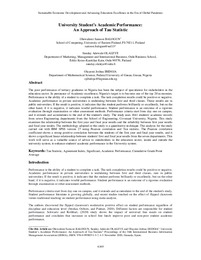| dc.contributor.author | Balogun, Oluwafemi Samson | |
| dc.contributor.author | Olaleye, Sunday Adewale | |
| dc.contributor.author | Ibidoja, Olayemi Joshua | |
| dc.date.accessioned | 2021-01-12T08:39:35Z | |
| dc.date.available | 2021-01-12T08:39:35Z | |
| dc.date.issued | 2020 | |
| dc.identifier.uri | https://erepo.uef.fi/handle/123456789/24199 | |
| dc.description.abstract | The poor performance of tertiary graduates in Nigeria has been the subject of speculation for stakeholders in the education sector. In pursuance of Academic excellence, Nigeria's target is to become one of the top 20 economies. Performance is the ability of a student to complete a task. The task completion results could be positive or negative. Academic performance in private universities is undulating between first and third classes. These results are in public universities. If the result is positive, it indicates that the student performs brilliantly or excellently, but on the other hand, if it is negative, it indicates woeful performance. Student performance is an outcome of a rigorous evaluation through examination or other assessment methods. Performance criteria start from day one on campus, and it extends and accumulates to the end of the student's study. The study uses 1841 students' academic records from seven Engineering departments from the School of Engineering, Covenant University, Nigeria. This study examines the relationship between the first year and final year results and the reliability between first year results and final year results. The methodology adopted in this study is a quantitative technique. The analysis for the study carried out with IBM SPSS version 27 using Pearson correlation and Tau statistic. The Pearson correlation coefficient shows a strong positive correlation between the students of the first year and final year results, and it shows a significant linear relationship between students' first and final year results from the seven departments. This work will serve as a valuable source of advice to stakeholders in the education sector, inside and outside the university system, to enhance students' academic performance in the University system. | |
| dc.language.iso | englanti | |
| dc.publisher | International Business Information Management Association (IBIMA) | |
| dc.relation.ispartof | Proceedings of the 36th International Business Information Management Association (IBIMA), Granada, Spain, 4-5 November, 2020 | |
| dc.rights | In copyright 1.0 | |
| dc.subject | Tau atatistic | |
| dc.subject | agreement index | |
| dc.subject | significant | |
| dc.subject | academic performance | |
| dc.subject | cumulative grade point average | |
| dc.title | University student's academic performance : an approach of Tau statistic | |
| dc.description.version | published version | |
| dc.contributor.department | School of Computing, activities | |
| uef.solecris.id | 75857378 | en |
| dc.type.publication | Artikkelit ja abstraktit tieteellisissä konferenssijulkaisuissa | |
| dc.description.reviewstatus | peerReviewed | |
| dc.format.pagerange | 6169-6181 | |
| dc.relation.isbn | 978-0-9998551-5-7 | |
| dc.rights.accesslevel | openAccess | |
| dc.type.okm | A4 | |
| uef.solecris.openaccess | Ei | |
| dc.rights.copyright | © 2020 The Authors | |
| dc.type.displayType | article | en |
| dc.type.displayType | artikkeli | fi |
| dc.rights.url | https://rightsstatements.org/page/InC/1.0/ | |


